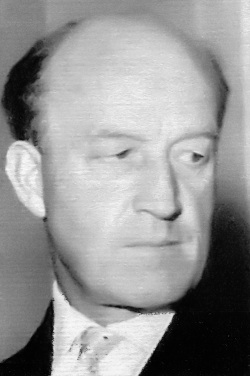 NORMAN CECIL TANNER
NORMAN CECIL TANNERAn article published in Number 38 of the Journal of the Association of Surgeons of Great Britain and Ireland, December 2012, about Norman Cecil Tanner.
 How does a quiet man, the antithesis of a self-promoter, appointed to what he once described to me as “the lowest possible status" as a surgeon, become the doyen of British and international general surgery?
How does a quiet man, the antithesis of a self-promoter, appointed to what he once described to me as “the lowest possible status" as a surgeon, become the doyen of British and international general surgery?
Norman Tanner, born in Bristol, qualified there and subsequently worked in several London County Council (LCC) hospitals, being appointed in I939 as Senior Resident Surgeon to St James Hospital in Balham. He never achieved a formal registrarship and his deafness precluded him from service in the armed services, but he was promoted to Consultant in I945, at a fulltime annual salary of £600. In I953, he was invited to join the staff of Charing Cross Hospital, London. At the interview, the senior physician admonished Tanner for lacking an MD but, with typical humility, he did not disclose that he had just submitted his thesis, which was successful.
Tanner worked through an epidemic of peptic ulceration during the Second World War, where his daily operating lists were astonishing. With no registrar, he and his theatre sister shared the post-operative care. He was able to report the outcome of l,275 procedures for duodenal, gastric and stomach ulcers with an overall mortality below l.5%, low morbidity and excellent cure rates. He encountered and developed the management of massive gastro duodenal bleeding from various causes in 650 patients. He was an early proponent of operating for gastric carcinoma while selectively excising lymph node groups based on the same principles as those applied by Clifford Dukes to large bowel carcinomas.
Tanner's elegant, gentle technique could be acquired and safely performed by surgeons of only average competence. Long before standardised techniques were elsewhere recognised as the only satisfactory way of comparing results, he was using them and proving that they worked. They exemplified the statement of Michael Polanyi: “By watching the master and emulating his efforts in the presence of his example, the apprentice unconsciously picks up the rules of the art, including those which ore not explicitly known to the master himself." Tanner’s recognition as a master was not bestowed by a committee but by the lengthy queue of hopeful applicants to be his assistants. These were initially trainees from the Commonwealth, as British registrars were reluctant to risk listing a mere LCC surgeon as an exemplar.
In the relaxed atmosphere following the Second World War, surgeons visited each other and watched new and highly effective operations being performed by the surgeons who developed them. They would turn up unannounced and be invited to ‘scrub up’ to assist and learn the fine points of technique; the giants of advanced countries crowded into Tanner's make shift operating theatre.
Those of us who had the privilege of working with him feel like a band of brothers, proud to declare “I’m a Tanner trainee”, and we are confident that others will recognise our provenance.